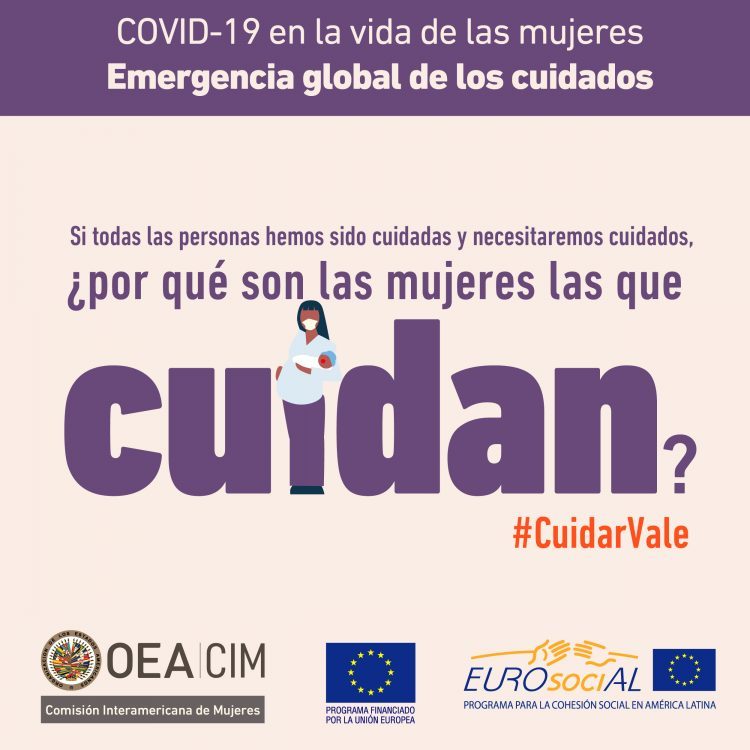On Thursday 9 September, the EU programme EUROsociAL+ and the CIM-OEA once again showed their determination to ensure the implementation of a care agenda with a gender perspective in public policies and recovery plans.

“The OAS-CIM has warned from day one that the pandemic has exacerbated existing gender inequalities and has led to serious risks that women’s acquired rights will be eroded. With these preliminary words, Luis Almagro, Secretary General of the OAS, opened the virtual dialogue organized jointly by the EU-funded EUROsociAL+ program – through its Gender Equality Policy component coordinated by Expertise France and Social Policies component managed by IILA, – and by the Inter-American Commission of Women of the Organization of American States.
This discussion meeting was linked to the release of the latest CIM/OAS publication, in cooperation with the European Union through its EUROsociAL+ program: COVID 19 at the Heart of Women’s Lives: Global Care Emergency. It was written in response to the worsening inequalities in the distribution of domestic and care tasks and the increasing burden of unpaid work performed by women. The document identifies new models of care that reflect the urgency of the situation in this area.
The virtual talk brought together a number of key players who invited us to ask ourselves: why are women the primary caregivers? Where are the men? What is the role of different sectors of society in the design of public policies on care?
Epsy Campbell, Vice President of Costa Rica, identified a global challenge in this area: States’ overall investment has not focused on care issues until now: “this issue was not included in previous budgets”. It will therefore be necessary to rethink – in the context of contracting economies – a way to integrate the issue of care in new budgets.
On the other side of the Atlantic, Felice Zaccheo at the EU, was more optimistic and saw this recovery phase – which corresponds to the start of the new EU programming for the period 2021-2027 – as an opportunity to “relaunch the social pillar, based on the lessons that this situation has left us” and thereby shape a vision that takes into account the gender perspective and the care workload in Europe and Latin America.
Cecilia Chacón, Secretary for Human Rights in Ecuador, placed the issue of care within the logic of the violet economy and the increase of human development. Carmen Espinoza, director of the organization Manuela Ramos in Peru, and Laura Baena, founder of the Club Malasmadres in Spain, expressed the views of civil society on the challenges that remain and the recommendations made by women’s organizations.
During the presentation of the document, the emphasis was placed on the omnipresence of care in daily life, the need to make visible the data related to this emergency, and the lessons learned from Europe in terms of care. There was general agreement that during the pandemic, the workload of providing unpaid care and attention to individuals had increased and continued to fall primarily on women. Women’s time had thus been strained, falling – as Alejandra Mora Mora, Executive Secretary of the CIM/OAS, said during the exchange – into an “inelasticity” that led to the need to design co-responsible public policies inside and outside the home.
Finally, both Felice Zaccheo from the EU and Carmen Espinoza Bernal, director of the Manuela Ramos movement in Peru, stated that care programs must be placed at the heart of recovery plans in order to rebuild a fairer, more resilient and more sustainable world, and above all not to leave anyone behind, an objective that aligns with the actions undertaken by the EUROsociAL+ program financed by the European Union.
To view the discussion, click on the following link : https://www.youtube.com/watch?v=FPYcEpgNqJo



